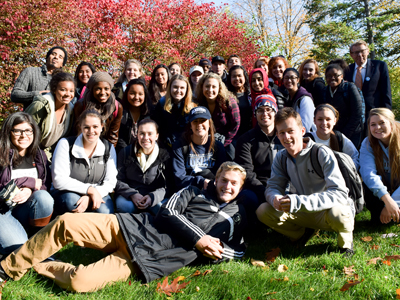
For some Elmhurst students, the first year of college can seem to last forever—in the best possible sense.
That’s because the College’s first-year programs offer students an introduction to college work and campus life that yields benefits for years to come.
“That whole first year set a pathway for me,” said Tyler Espino, a senior accounting major. As a first-year student, he took Professor Mary Kay Mulvaney’s first-year seminar, Exploring Chicago. “That was the class that got me ready for every other class I took. It made me a little more comfortable with working hard and made me confident that I could handle the work.”
Each of the semester-long first-year seminars leaps across disciplinary boundaries to address diverse topics: the 1960s, health care in the United States, art and activism, and the relationship between humans and animals, to name a few. (The College is offering 26 different seminars this year.) For all the variety in subject matter, all of the seminars share common aims: to introduce students to college-level work in the liberal arts, and to integrate them into the campus community.
“We want students to be prepared for success in college and beyond,” said Michael Lindberg, associate professor and director of the first-year seminars.
Similar first-year courses have become popular at many colleges, but Elmhurst’s seminars are unusual in their academic focus.
“This really is unique,” Lindberg said. “Other colleges focus only on the transition to college life. Our seminars are academically based, with all these creative and engaging topics. And along with that, we build students’ connections to the community and introduce them to the resources here.”
Taught in tandem by a professor and a College staff member, the seminars build on the College’s intensive new-student orientation called Big Questions: What Will You Stand For? The orientation schedule is filled with activities ranging from service projects and personal reflection to challenge courses and team-building activities. Students go through their orientation and their first-year seminar with the same cohort of about 18 peers, quickly creating a surprisingly powerful bond with a small group of new friends.
“The relationships they form are such a strong foundation for the rest of their time at Elmhurst,” said Michelle DeLuca, director of first-year experience and students in transition. “They talk about values and meaning in orientation and seminars, and those can be heavy-duty conversations. But we have such a family feeling. We want to create an environment where you can break down barriers and share.”
The hybrid approach has won the College national notice. Faculty and administrators from Elmhurst have made presentations about the first-year experience at national conferences. And in 2010, the College won a Promising Practices award from the National Association for Student Personnel Administrators for the first-year program.
Several studies have indicated that college students who become involved on campus early in their time in college are more likely to thrive and are less likely to leave school before graduation. First-year programs at Elmhurst are designed to promote the kinds of social and academic connections that contribute to student success.
“It makes a big difference that they have this base of support from peers they bond with right from the beginning,” Lindberg said.
Just as important are the connections forged with faculty and staff. First-year students meet regularly with their seminar instructors. Assistant Professor Kyle Bennett, who teaches a first-year seminar called Understanding Animal Diversity, said that students come to see him not only about their progress in his class but about whatever is on their minds.
“As a result of their first-year experience, they know that there are people on campus who care deeply about their success. They know they can come see me to ask about anything,” he said. “It’s important for them to know that we are not unapproachable.”
Bennett called a visitor’s attention to a stack of student papers awaiting grades. Bennett was planning to read them that afternoon, but three of his first-year students had stopped by to chat. He would be working late to catch up, but Bennett was not complaining.
“They just wanted to talk about how it’s going. And if you have a professor who cares, well, there’s a ton of value in that,” Bennett said. “It’s important to help them get their sea legs in their first year in college. I like being a part of that. I like seeing it happen.”